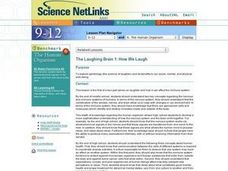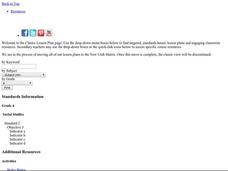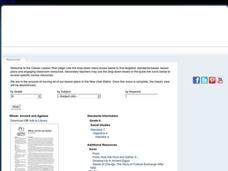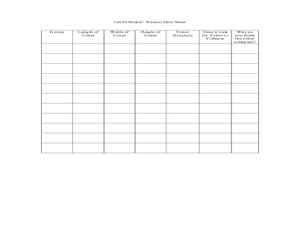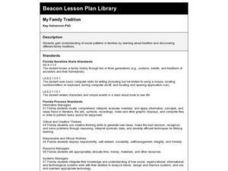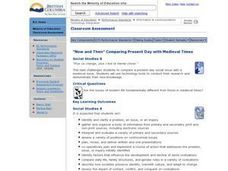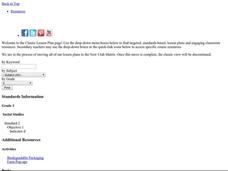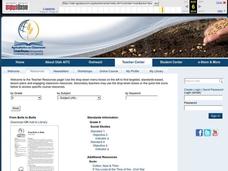Curated OER
The Laughing Brain 1: How We Laugh
Young scholars to rate themselves on a scale from 1 to 10 (10 being the happiest) as to how happy they feel and write their rating on a sheet of paper. They explore gelotology (the science of laughter) and its benefits to our social,...
Curated OER
Keep It Cool
Pupils complete a science experiment to study insulation, heat transfer, and permafrost. In this permafrost study lesson, students design and test a soda insulator. Pupils graph their class data and discuss the results. Students discuss...
Curated OER
Ancient Greece Across the Curriculum
Sixth graders explore Ancient Greece using resources in literature, math, social studies, and science.
Curated OER
Defining Drought
Students examine the hydrologic impacts of drought. They look at drought from a variety of prespectives. Students first focus on the scientific definition of drought, including weather patterns, water cycles, water requirements by plants...
Curated OER
Our Treasured Trees
Young scholars discuss natural resources and renewable resources with trees being considered renewable resources which need special attention. In this Earth science lesson, students write a list of reasons for why it would be good to...
Curated OER
Breath of Fresh Air
Students consider the historical and social aspects of smoking. In this current events activity, students research passive smoking, smoking legislation, and smoking history in the United Kingdom as they visit the listed websites.
Curated OER
Catch the Gullah Beat: Rhythm and Percussion
Students explore the Gullah culture. In this social studies instructional activity, students construct and play instruments similar to those of the Gullah people.
Curated OER
The Dairy Shoppe
Fourth graders examine the dairy industry. In this Social Studies lesson, 4th graders investigate the various products made from milk. Students look at entrepreneurship and independent farmers in the dairy industry.
Curated OER
Wheat: Ancient and Ageless
Sixth graders investigate the role of wheat in society. In this Social Studies lesson, 6th graders explore wheat production from ancient civilizations to modern times. Students describe wheat's importance in shaping culture.
Curated OER
Women's Brains
Students experience an example of bias in science dealing with women and gender.
Curated OER
River Planning
Students use a model to conduct an experiment involving dam construction. Based on their observations, they draw conclusions about social, economic, and and environmental issues and make a decision concerning dam location. As a group,...
Curated OER
Children's Literature Across the Curriculum Ideas-In The Small Small Pond
Students read In The Small Small Pond by Denise Fleming. They complete a variety of cross-curricular activities surrounding the study of the pond ecosystem. Included are reading, art, math, science, writing, social studies, and library...
Curated OER
Gender Disparity on Display
Students explore an article and discuss what gender differences. In this exploring gender lesson students divide into groups and develop a social theory.
Curated OER
Jell-O-Shakin
Students design a tower made of jell-o. In this science lesson, students investigate what it takes to build a jell-o building that will not fall when shaken. They discuss what causes earthquakes and how it is controlled.
Curated OER
My Family Tradition
Students examine different family traditions to further explain social patterns. They complete a graphic organizer using educational software.
Curated OER
"Now and Then" Comparing Present Day with Medieval Times
Eighth graders compare a present-day social issue with a medieval issue. They use technology tools to conduct their research and demonstrate their new knowledge. Students present their findings to the class in the form of a PowerPoint.
Curated OER
Making Good Decisions
Students practice balancing different interests involved in solving social problems, looking for the most realistic solution based on the advantages and disadvantages. They also consider the concept of compromise.
Curated OER
More than One Way of Knowing
Young scholars compare the obeservations of traditional people with the oberservations of Western science. They validate Traditional Ecological Knowledge (TEK) and Inuit Qaujimajatuqangit (IQ) through comparison and the identification...
Curated OER
Introduction to Toxicology
Students explore the science of toxicology and the relationship between a toxic reaction (response) and amount of substance (dose). They observe two demonstrations illustrating the concept of dose-response.
Curated OER
Gotta Be Me
Students create model societies. In this social identity lesson, students conduct research so that they can plan and present model societies to their classmates. The societies must include information regarding how their society will...
Curated OER
Temperate Forests vs. Wetlands
Students compare and contrast the temperate forest and wetlands by researching them in groups. For this forest lesson plan, students identify the economic, ecological, and social benefits of each.
Curated OER
Source Search
Students discuss the sources of items they use everyday. In this social studies instructional activity, students sort pictures of items used everyday by their source. Students participate in a source relay.
Curated OER
Utah's Own
Fourth graders examine the effects of humans on the environment. In this Social Studies activity, 4th graders analyze human changes to the environment. Students explore the actions and effects at a community level.
Curated OER
From Bolls to Bolts
Fifth graders explore the economic effects of the colonization of North America. In this Social Studies lesson, 5th graders examine the economic and cultural results that occurred due to North America entering the market. Students...
Other popular searches
- Social Science Role Play
- B Ed Social Science
- Unit Plan Social Science
- Social Science Lesson Plans
- Social Science Research
- Activity Social Science
- History and Social Science
- Social Science Powerpoint
- Social Science in Grade 3
- Social Science Methodology
- History Social Science
- Social Science Ducks


